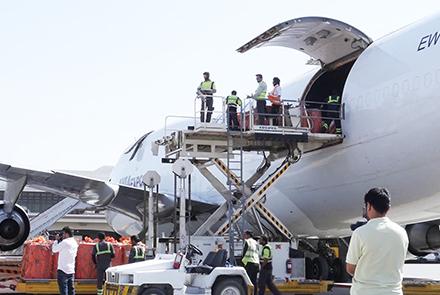The Public Relations Office of the Senior Advisor to the President in Banking and Finance said Tuesday that within a week an air cargo route between Kabul and Jeddah will be launched.
The office said an agreement has been signed between Afghanistan and Saudi Arabia and it is expected that the first flight will transport 500kg of saffron to Saudi Arabia.
According to officials, Afghanistan has earned $51 million since June last year, when the first air freight route was launched between Kabul and Delhi.
Since then, exports, air freighted out of the country, have increased considerably, officials said.
Two air corridors were launched between Afghanistan and India last year, followed by another to Kazakhstan and then to Turkey.
Saudi Arabia will be Afghanistan’s fifth air cargo route.
According to the finance and banking department in the president's office, plans are also underway to launch an air cargo route with the United Arab Emirates and with European countries.
“We are supposed to finalize another memorandum (of understanding) with the UAE, which is to do with the first (cargo) flight to Dubai. In the meantime, we are in the final stages of signing a memorandum of understanding with (European Union),” said Sameer Rasa, the Head of the Public Relations Office of the Senior Advisor to the President in Banking and Finance.
The Chamber of Commerce and Industries (ACCI) meanwhile believes that the air corridors have also had a positive impact on the overland cargo transport industry.
“We had a discussion about access to markets, the issue of overland problems that unfortunately sometimes affected businessmen and the private sector; this problem has been answered to a large extent, and the most important goal for the establishment of air corridors is undoubtedly easy and inexpensive access to markets around the region and the world,” said Shafiq Attai, ACCI technical assistance manager.
According to the Public Relations Office of the Senior Advisor to the President in Banking and Finance, over 100 cargo flights have left Afghanistan in the past year. In total, three flights went to Istanbul, five to Almaty and the rest to Delhi and Mumbai.
In total, 2,600 tons of dry and fresh fruits, medicinal plants and carpets were exported to India, Kazakhstan and Turkey.
Afghanistan’s economy is heavily reliant on imports, but it is hoped that as the country transitions to a more export-oriented economy, transporting goods by air will provide significant opportunities to increase economic growth.
Being hampered by its landlocked location, Afghanistan’s traders have in the past been plagued by unpredictable trade barriers – particularly through Pakistan, which has in the past been known to close borders without any notice.
Government has however paid much attention in the past year to establishing regular air cargo flights in order to ensure a more secure and reliable mode of transport for exports.


